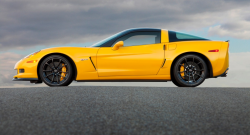
— A Chevy Corvette engine class action lawsuit is over after a district court dismissed the lawsuit and an appeals court agreed with the dismissal.
The plaintiffs claim the valve guides in the Corvette Z06 LS7 engines are defective, causing complete failures of the engines.
The engine class action lawsuit includes 2006-2013 Chevy Corvette Z06 cars equipped with LS7 7-liter V8 engines.
The plaintiffs allege the clearance levels of the valve guides go too far in the Corvettes and GM has allegedly done nothing to fix the engine problems. The Corvette class action also says the automaker tells customers valve noise is normal for this type of V8 engine.
According to the lawsuit, GM knew there were valve guide problems with the Corvette engines because a test was created to check for guide problems. But the class action alleges the test was ended once GM saw the results which would possibly cause investigations and Corvette recalls.
By allegedly concealing known Corvette engine issues, GM could continue selling the cars to customers who believed they were purchasing safe vehicles.
Corvette Engine Class Action Lawsuit Dismissed
The district court granted summary judgment to General Motors on all of plaintiffs' claims in the Corvette class action lawsuit.
Seventeen plaintiffs then appealed the district court's ruling, but the Ninth Circuit Court of Appeals agreed with the lower court dismissal because the plaintiffs "have failed to produce admissible evidence that their vehicles actually contained the alleged valve guide defects."
According to the Ninth Circuit, a plaintiff must provide evidence "such that a reasonable juror drawing all inferences in favor of the [plaintiff] could return a verdict in [her] favor" to survive a motion for summary judgment.
The plaintiffs allegedly failed to meet the requirements because the plaintiffs admit the only evidence of an engine defect is "expert declarations." However, the appeals court found the declarations are not admissible.
"Because Plaintiffs failed to timely serve disclosure of expert witnesses as required under Federal Rule of Civil Procedure 26(a)(2)(B), their expert declarations are not admissible. Those same experts cannot be used as rebuttal experts because rebuttal testimony refers 'solely' to evidence 'intended . . . to contradict or rebut' other expert testimony."
According to the court, because General Motors didn't present expert testimony to rebut, the plaintiff's expert declarations are not admissible as rebuttal evidence.
The Chevy Corvette engine class action lawsuit was filed in the United States District Court for the Central District of California - Estate of William D. Pilgrim, et al., v. General Motors Company LLC.
The plaintiffs are represented by Knapp Petersen and Clarke.




